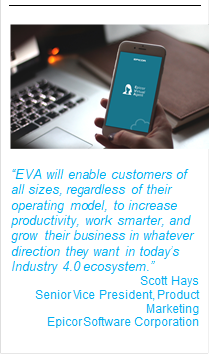Epicor Software Corporation, a global provider of industry-specific enterprise software to promote business growth, is today announcing the release of Epicor Virtual Agent (EVA), its new enterprise-wide digital agent designed to help users work smarter and accelerate pace of operations across the business more easily.
Developed to execute tasks and recommend, predict, and adjust actions within set parameters, EVA appears on-screen as a virtual assistant that users can access via text or voice. Along with cognitive skills such as text and voice, EVA transforms data into visual information, creating an intuitive experience to complete actions on native devices. Powered by Natural Language Processing (NLP), users can access EVA from their mobile devices and the agent will deliver targeted information to help them make better, faster decisions.
Beyond the request/response conversational experience, EVA also uses artificial intelligent (AI) capabilities to proactively deliver alerts and carry out targeted actions based on combinations of events, market statistics, and historical data. Designed to extend and support the workforce, EVA can contribute timely insights that improve accuracy, problem-spotting, and can even forecast and automatically adjust production or distribution levels in-line with customer demand.
“New forms of interacting with business software solutions are a key to accelerating the pace of operations and improving the exchange of data and information,” said Scott Hays, senior vice president, product marketing at Epicor. “Having an intelligent agent at hand will help companies become more agile and responsive to unexpected events and rapidly changing customer demands.”
According to industry analyst firm Gartner[1], more than 50 percent of all people collaborating in Industry 4.0 ecosystems will use virtual assistants or intelligent agents to interact more naturally with their surroundings and with people by 2022. IDC[2] predicts that by the same year, task-level intelligent applications (apps) that augment human efforts will account for 30 percent of the enterprise apps market. According to IDC, by 2027 the advances in unsupervised and reinforcement machine learning will enable cognitive/AI systems that can detect and sense their environment, learn independently, and make decisions on their own or provide humans with constraint-optimised recommendations.
“With EVA, you interact naturally with your ERP system,” comments Hays. “It’s as easy as just talking or typing to a colleague. This makes the breadth and depth of the industry-specific functionality and information available inside the system directly accessible to a larger audience, boosting productivity and efficiency, and giving the company an improved return on their ERP investment.”
Developed using AI services from Microsoft Azure, EVA can be added to all sizes and types of Epicor ERP implementations—on-premise as well as in the cloud. This ensures customers of any size, including small and medium-sized companies, can take advantage of innovative technologies that will help them grow their businesses.
“As consumers we’re already familiar with conversational technology. EVA will be easy for users to start working with straight away. Furthermore, thanks to its machine learning component, the more you use EVA, the better it will work for you,” said Hays. “We are confident that using an artificial intelligence-based agent that has deep industry-specific applications will make their enterprise systems more predictive, adaptive, and proactive. EVA will enable customers of all sizes, regardless of their operating model, to increase productivity, work smarter, and grow their business in whatever direction they want in today’s Industry 4.0 ecosystem.”
During its global user conference, Insights 2019, held in Las Vegas, Epicor showcased several industry-specific use cases for EVA.
• Manufacturing—using EVA to detect an anomaly early on in a production machine that, if left untouched, could lead to unplanned downtime and sub-standard product quality. Data from machines and IoT sensors, combined with Epicor ERP, provides a virtual nervous system that delivers AI-driven alerts from EVA to a mobile device. With just a few clicks on the device, the production manager can confirm suggestions from EVA to schedule preventive maintenance for a machine and shift production to other available machines.
• Distribution—enabling outside sales representatives to obtain instant and easy access to product, price, and availability information, and create a quote on a mobile device while meeting with a customer. This time-saving process is made possible by EVA’s conversational user interface (UI), based on natural language processing.
• Retail—making cross-sell and up-sell recommendations in real-time while helping a retail customer in the aisles to make a purchase decision, thanks to an AI-powered recommendation engine based on market analysis.
• Automotive Aftermarket—using AI to evaluate a massive dataset of vehicle registrations and parts failure trends by region, EVA is able to notify an auto parts distributor of specific parts that need an immediate increase in stock levels for selected regions due to a projected increase in demand.




